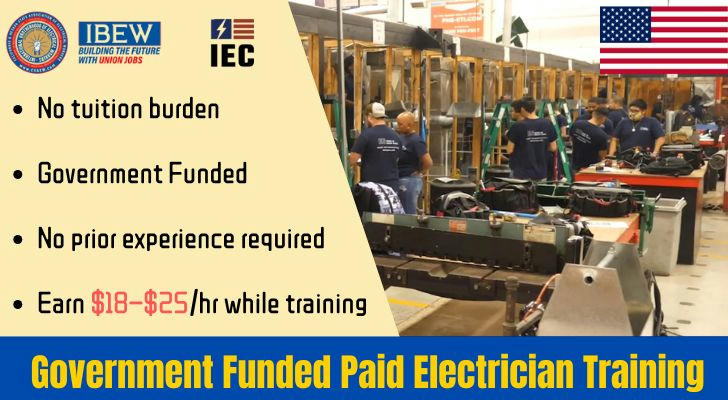Government Funded Paid Electrician Training
🔎 Helping you find reliable and rewarding training opportunities across the U.S.
🟥No prior experience required| Tuition fees covered | Completed with certification | Get $18–$25/hour while you train🟥
Becoming a certified electrician no longer means sacrificing months of income. Across the United States, several government-funded paid training programs allow aspiring electricians to earn while learning. These programs aim to solve the problem of high tuition and provide hands-on skills to help trainees enter the electrical industry with confidence — and a paycheck.

Government-Funded Program Advantages
- 💸 Earn while you learn — trainees receive hourly pay during the program.
- 🧰 Practical, hands-on training supervised by licensed professionals.
- 🏫 Tuition-covered education with costs covered by federal or state funding.
- 📜 Industry-recognized certifications upon completion.
- 🌎 Job placement assistance with local unions or private employers.
- 🕒 Short duration — most programs last between 10 to 16 weeks.
Available Government-Funded Paid Electrician Programs
Job Corps Electrical Training
A U.S. Department of Labor initiative offering training, housing, and stipends for young adults aged 16–24.- Duration: 8–12 months (includes classroom + hands-on training)
- Pay: Stipends provided during training
IBEW Apprenticeship Programs (via NECA-IBEW)
Sponsored by the federal government, these programs allow trainees to earn while they complete a 4–5 year apprenticeship under licensed electricians.- Pay: Starts around $20/hour and increases annually
Workforce Innovation and Opportunity Act (WIOA) Training
A federal program funding local workforce boards to cover electrician training tuition and provide living stipends.- Available in most states
State and Community College Electrician Programs
Many states (e.g., California, Texas, and Florida) offer short-term paid training or subsidized courses via local technical colleges.
Who Can Apply
- U.S. citizens or legal residents aged 18 and above
- Individuals seeking a career change or trade certification
- Unemployed or underemployed persons
- High school graduates or GED holders
- Veterans eligible for GI Bill benefits
Application Steps
- Research local programs — visit your state’s Department of Labor or Job Corps site.
- Prepare documents — ID, proof of residence, and education credentials.
- Submit an online application — most forms are available year-round.
- Interview or orientation — attend an introductory session or skill test.
- Begin training — receive on-the-job instruction and pay during the program.
Eligibility Requirements
- Must be legally authorized to work in the U.S.
- Ability to meet basic physical requirements for electrical work
- Commitment to full program duration
- No serious criminal background (varies by program)
FAQ
1. Do I need prior experience?
No, most government-funded programs are designed for beginners.
2. Will I be paid during the entire training?
Yes, qualified trainees earn hourly pay throughout the program.
3. Are tools and materials provided?
Yes, most programs supply basic tools or reimburse training expenses.
4. Can veterans use GI Bill benefits?
Yes, many apprenticeship programs accept GI Bill funding.
5. What kind of jobs can I get after completion?
Graduates can become residential, commercial, or industrial electricians, with pathways to master electrician certification.
Conclusion
Government-funded paid electrician training programs make it possible to gain valuable trade skills without financial strain. Whether you join Job Corps, WIOA, or an IBEW apprenticeship, you’ll receive a mix of classroom learning and hands-on experience — while getting paid to train. This is an opportunity to start a stable, high-demand career in the electrical field, debt-free.
